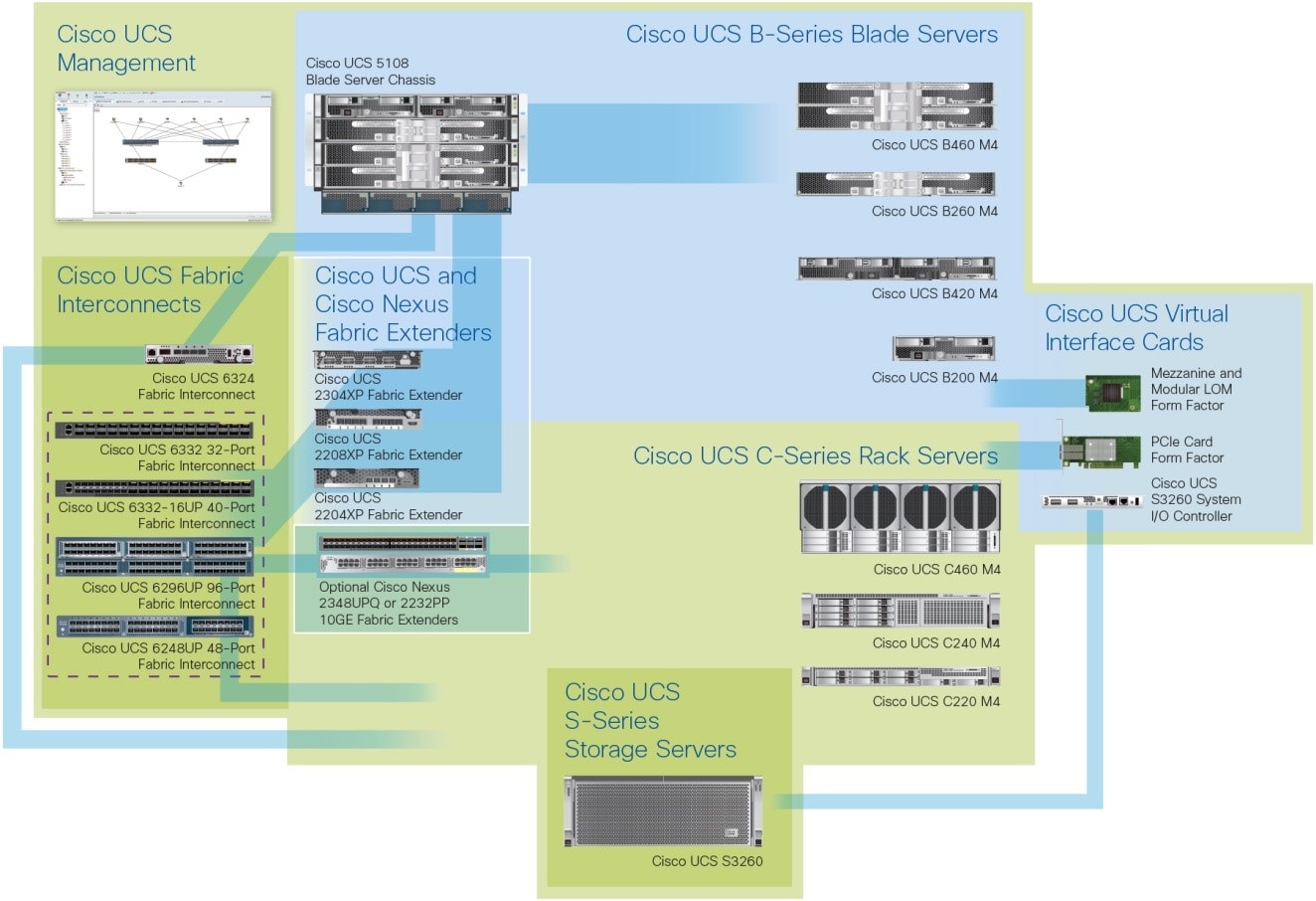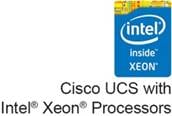Cisco UCS B200 M4 Blade Server Data Sheet
Available Languages
Bias-Free Language
The documentation set for this product strives to use bias-free language. For the purposes of this documentation set, bias-free is defined as language that does not imply discrimination based on age, disability, gender, racial identity, ethnic identity, sexual orientation, socioeconomic status, and intersectionality. Exceptions may be present in the documentation due to language that is hardcoded in the user interfaces of the product software, language used based on RFP documentation, or language that is used by a referenced third-party product. Learn more about how Cisco is using Inclusive Language.
Product Overview
The Cisco Unified Computing System™ (Cisco UCS®) combines Cisco UCS B-Series Blade Servers and C-Series Rack Servers with networking and storage access into a single converged system with simplified management, greater cost efficiency and agility, and increased visibility and control. One of the newest servers in the Cisco UCS portfolio is the Cisco UCS B200 M4 Blade Server.
The UCS B200 M4 Blade Server (Figure 1) delivers performance, flexibility and optimization for data centers and remote sites. This enterprise-class server offers market-leading performance, versatility, and density without compromise for workloads ranging from web infrastructure to distributed databases. The Cisco UCS B200 M4 server can quickly deploy stateless physical and virtual workloads, with the programmable ease of use of the Cisco UCS Manager software and simplified server access with Cisco®SingleConnect technology. Based on the Intel® Xeon® processor E5-2600 v4 and v3 product family, it offers up to 1.5 TB of total memory when using 64 GB DIMMs, up to two drives, and up to 80 Gbps I/O throughput. The Cisco UCS B200 M4 offers exceptional levels of performance, flexibility, and I/O throughput to run your most demanding applications.
In addition, Cisco UCS has the architectural advantage of not having to power and cool excess switches, NICs and HBAs in each blade server chassis. Having a larger power budget per blade server provides uncompromised expandability and capabilities, as in the new Cisco UCS B200 M4 server with its leading memory-slot and drive capacity.

Cisco UCS B200 M4 Overview
The Cisco UCS B200 M4 provides:
● Up to two multicore Intel Xeon processor E5-2600 v4 and v3 series CPUs for up to 44 processing cores.
● 24 DIMM slots for industry-standard DDR4 memory at speeds up to 2400 MHz and it offers up to 1.5 TB of total memory when using 64 GB DIMMs.
● Two optional, hot-plug, SAS and SATA hard disk drives (HDDs) or solid-state drives (SSDs).
● Cisco UCS Virtual Interface Card (VIC) 1340: a 2-port, 40 Gigabit Ethernet, Fibre Channel over Ethernet (FCoE)-capable modular LAN on motherboard (mLOM) mezzanine adapter.
◦ 2x ports - 40 Gbps Unified I/O portsor2 sets of 4 x 10-Gbps unified I/O ports
◦ Delivers 80 Gbps to the server
◦ Adapts to either 10 Gbps or 40 Gbps fabric connections
● Cisco FlexStorage local drive storage subsystem provides flexible boot and local storage capabilities. It allows you to:
◦ Support for optional NVIDIA M6 GPU
◦ Configure the Cisco UCS B200 M4 to meet your local storage requirements without having to buy, power and cool components that you do not need.
◦ Choose an enterprise-class RAID controller, or go without any controller or drive bays if not utilizing local drives
◦ Easily add, change, or remove Cisco FlexStorage modules
● The Cisco UCS B200 M4 server is a half-width blade. Up to eight can reside in the 6-rack-unit (6RU) Cisco UCS 5108 Blade Server Chassis, offering one of the highest densities of servers per rack unit of blade chassis in the industry.
Overview
The Cisco UCS B200 M4 server is suited for a broad spectrum of IT workloads, including:
● IT and web infrastructure
● Virtualized workloads
● Consolidating applications
● Virtual desktops
● Middleware
● ERP and CRM applications
● Single-instance and distributed databases
The Cisco UCS B200 M4 Blade Server is one member of the Cisco UCS B-Series Blade Servers platform. As part of Cisco UCS, Cisco UCS B-Series servers incorporate many innovative Cisco technologies to help customers handle their most challenging workloads. Cisco UCS B-Series servers within a Cisco UCS management framework incorporate a standards-based unified network fabric, Cisco Data Center VM-FEX virtualization support, Cisco UCS Manager, Cisco UCS Central, Cisco UCS Director software, and Cisco fabric extender architecture (Figure 2)

Features and Benefits of the Cisco UCS B200 M4 Server
Table 1 lists the main features and benefits of the Cisco UCS B200 M4.
Table 1. Main Features and Benefits
| Feature |
|
|
●
SingleConnect technology: wire once and provision or repurpose any workload in minutes, not days. No need to rewire as the server application-centric personality is assigned through software.
●
Fewer cables, HBAs, NICs, and switches to purchase, warranty, power, cool, and maintain.
●
True server unification of servers, LAN and SAN with a single pane of management (UCS Manager/Central).
●
Wire servers
once, deploy and repurpose servers through software - no more rewiring.
|
|
|
● Helps reduce the number of manual steps required to deploy servers in the data center, improving server policy consistency and coherency.
● Deploy servers for any application in a consistent, automated and repeated manner through UCS Manager/Central/Director and service profiles.
◦ a Less configuration drift among servers.
● Future foundation and management paradigm for fast, consistent server provisioning of new servers and repurposing of old servers for other workloads.
● Allows servers and support infrastructure to be provisioned in minutes instead of days, shifting IT's focus from maintenance to strategic initiatives.
● Enables service profile movement from blade to blade, rack server to blade, blade to rack server, or blade to blade in another chassis.
|
|
| Cisco UCS Manager Open XML, API (Increases Automation) |
● UCS Manager is an open architecture with an API-first, automation-friendly design; rich interoperability across management and platform ecosystem.
● Unique visibility into the UCS system above UCS Manager to UCS Director and other third-party management tools.
● An almost unsurpassed ability to monitor, query and automate server hardware at a granular level.
● UCS Manager XML APIs enable integration with new and existing data center infrastructure and XML-based SDK for commercial & custom implementations.
● UCS Manager/Central offer full APIs, such as IPMI, SMASH-CLP, WS-MAN, and XML to enable third party software to integrate into UCS Manager.
● Complete Cisco UCS PowerTool for PowerShell scripting for automation of nearly every UCS Manager action.
|
| Cisco UCS FlexStorage®technology |
● Allows you to choose exactly the blade storage and storage controller, you need; with a choice of hard disks (SSD, SATA, or SAS) with a 12Gb SAS controller, or no disks or controller with blanking disks.
|
| Performance |
●
Cisco UCS servers have delivered over
111 world records to date
and the UCS B200 series blade servers have contributed 30 world records spanning a wide range of workloads including:
◦ a VMware VMmark
◦ b VMware View Planner
◦ c Oracle E-Business Suite
◦ d SAP
◦ e JD Edwards
◦ f Siebel
◦ g SPECjbb2013
◦ h SPEC_fp_rate_2006
◦ i SPEC_int_base_2006
This diversity of world records underscores the history of ground-breaking performance upon which the Cisco UCS B200 M4 is built. |
|
● Cisco UCS Manager XML API enables unique monitoring, visibility, and automation for nearly every server attribute.
|
|
| Cisco UCS Virtual Interface Card (VIC) 1340 |
●
1200 Series VICs enable advanced networking features including Netflow for network statistics, and DPDK, USNIC for low latency computing applications.
●
1300 Series VICs include all of the 1200 Series features plus additional enhancements including network overlay offload support for NVGRE and VXLAN, and RoCE services.
●
2-port, 40 Gigabit Ethernet, Fibre Channel over Ethernet (FCoE)-capable modular LAN on motherboard (mLOM) mezzanine adapter.
●
2x ports - 40 Gbps Unified I/O ports or 2 sets of 4 x 10-Gbps unified I/O ports.
●
Delivers 80 Gbps total I/O throughput to the server.
●
Adapts to either 10 Gbps or 40 Gbps fabric connections.
●
Creates up to 256 fully functional unique and independent PCIe adapters and interfaces (NICs or HBAs) without requiring single-root I/O virtualization (SR-IOV) support from operating systems or hypervisors.
●
Provides virtual machine visibility from the physical network and a consistent network operations model for physical and virtual servers.
●
Supports customer requirements for a wide range of operating systems and hypervisors Microsoft Windows, Red Hat Enterprise Linux, SUSE Linux, VMware vSphere, and Citrix XenServer.
|
| Cisco FlexFlash |
●
Dual SDHC flash card sockets are provided on the front left side of the server.
|
|
● The Intel Xeon processor E5-2600 v4 and v3 product family is designed to deliver the best combination of performance, built-in capabilities, and cost effectiveness.
● DDR4 memory technology
● Offers built-in measuring and monitoring capabilities that make the Intel-powered platform the smart choice for a software-defined world.
● Provides a broad set of platform options that deliver choice and value for different market segments.
● Incorporates Intel Xeon Processor E5-2600 v4 and v3 Product Family newest and latest virtualization and security features:
◦ Virtualization:
◦ Virtualization: VM Control Structure (VMCS) Shadowing
◦ Cache QoS Monitoring
◦ A/D bits for Extended Page Tables (EPT)
◦ Security:
◦ General Crypto Assist†
◦ Asymmetric Crypto Assist†
◦ Symmetric Crypto Assist†
◦ SMM External Call Trap (SECT)
● Cisco UCS B-Series servers keep pace with Intel Xeon processor innovation by offering the latest processors with increased processor frequency and improved security. Based on the Intel Xeon Processor E5-2600 v4 and v3 Product Family, Cisco UCS B-Series Blade Servers offer improved price-to-performance, making Cisco UCS servers one of the best values in the industry.
|
Specifications
Table 2 provides specifications for the Cisco UCS B200 M4.
Table 2. Product Specifications
| Item |
|
|
For a complete list of processor options, please refer to the corresponding
spec sheet.
|
|
|
For a complete list of processor options, please refer to the corresponding
spec sheet.
|
|
|
● Advanced ECC
|
|
|
> Optional 12Gb SAS RAID Controller (LSI SAS 3108) with built-in 2GB flash-backed write cache
|
|
| Flash memory |
● 2 slots for 32 or 64-GB SD flash memory cards
|
Table 3. Regulatory Standards Compliance
Warranty Information
Find warranty information at Cisco.com on the Product Warranties page.
Cisco Unified Computing Services
Using a unified view of data center resources, Cisco and our industry-leading partners deliver services that accelerate your transition to a unified computing environment. Cisco Unified Computing Services can help you create an agile infrastructure that accelerates time to value, reduces costs and risks, and maintains availability during deployment and migration. After deployment, our services can help you improve performance, availability, and resiliency as your business needs evolve, and mitigate risk further. Quickly deploy your data center resources and optimize ongoing operations to better meet your business needs. For more information about these and other Cisco Data Center Services offerings, visit http://www.cisco.com/go/unifiedcomputingservices or http://www.cisco.com/go/dcservices.
Cisco Capital
Financing to Help You Achieve Your Objectives
Cisco Capital can help you acquire the technology you need to achieve your objectives and stay competitive. We can help you reduce CapEx. Accelerate your growth. Optimize your investment dollars and ROI. Cisco Capital financing gives you flexibility in acquiring hardware, software, services, and complementary third-party equipment. And there’s just one predictable payment. Cisco Capital is available in more than 100 countries. Learn more.
For More Information
For more information about Cisco UCS B-Series Blade Servers, visit http://www.cisco.com/en/US/products/ps10280/index.html or contact your local Cisco representative.
